牛津英语模块七unit2知识点
牛津高中英语模块七_unit2_reading

Module 7 unit2 Fit for lifeaspirinpenicillin❖What are the two medicines mentioned in the article?❖When was one of the medicines first sold as a tablet?❖What did Fleming, Florey and Chain share?➢When did people find that drinking a specialtea could reduce fever and pain?➢When was ASA first made from other chemicals?➢What other things can ASA help with besides reducing fever and pain?➢Where did Alexander Fleming find penicillin?➢What illnesses can penicillin be used to treat?➢Why were Fleming, Florey and Chain given the Nobel Prize in Physiology or Medicine in 1945?Fill in the boxes. Sold in shopsas a tablet 19001928Discovered by Alexander Fleming WorldWar IIFound newchemicaltechniquesto purify itAll the scientistsshared the NobelPrize1945As the best-selling painkillerrecorded in theGuinness Book195019711977200319001928WorldWar II19451950197119772003 Proved to be ablood-thinningmedicineUsed to prevent astrokeUsed to reduceblood sugar levelsFill in the boxes.1. physician2. bark3. painkiller4. thinning5. contemporary6. transparent7. purify8. quantities9. widespread a.modern, of present timeb.happening in a lot of placesc.a medical doctor who does not perform operationsd.amounts of somethinge.the skin of a treef.to make pureg.a type of medicine used to reduce painh.clear and able to be seen throughi.making a liquid less thickaspirin a medicine that was __________in1897. It has saved and brought relief to millions of people ’s lives. It is made from a chemicalcalled _____and was first sole as a tablet in1900. This was the first medicine to be sold as a standardized ______. It works by reducing fever and pain. It is now______________for reducingpotential heart attacks, strokes and cancer.Many reports have been___________abouthow aspirin can improve people ’s health.published; recommended; ASA; tablet ; invented invented ASA tabletrecommended publishedcontemporary; discovered; availablepenicillin a chemical in mould that was first __________in 1928, but it was not until World War II that penicillin was purified to be used as a medicine. It was needed as soon as it was ________because there were many people injured in the war. It was fundamental to saving many thousands of lives and is one of the most important medicines of _____________society.discovered available contemporaryDiscussionWhat do you think the world would be like ifthere were no medicines?Retell the text.Finish EX. D1&D2 on page113。
Unit2知识点和考点2022-2023学年牛津译林版七年级英语下册
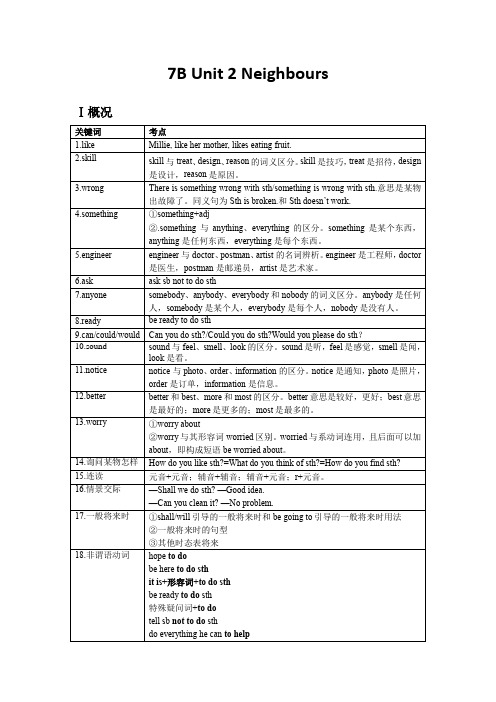
4.There is something wrong with my computer.
(1)something的基本含义做不定代词,意思是某个东西,某件事。
(2)something的核心考点之一考察不定代词与形容词的位置关系。当形容词修饰不定代词时,形容词置于不定代词后面。比如anythinginteresting
11.notice
notice与photo、order、information的区分。notice是通知,photo是照片,order是订单,information是信息。
12.better
better和best、more和most的区分。better意思是较好,更好;best意思是最好的;more是更多的;most是最多的。
【2022年无锡】lie,her mother,eating fruit.
A.likes; likeB.like; likesC.like; like D.likes; likes
答案B
2.They often meet at the community center and share their different skills.
—I don’t mind. ________—whatever you have got.
A.NothingB.AnythingC.SomethingD.Everything
答案B
【2022年南外】5.Next weekend, Uncle John plans to do ________, only stay at home to have a rest.
A. to stay upB. don’t stay upC. doesn’t stay upD. not to stay up
Unit2知识点整理牛津译林版七年级英语上册

7A Unit 2 知识点整理1.many times a day 一天许多次once一次/twice两次/...times ......次Eddie walks to his bowl three times a day.(对画线部分提问)How often does Eddie walk to his bowl?Eddie walks to his bowl three times a day.(对画线部分提问)How many times does Eddie walk to his bowl a day.2.walk to my bowl 走向我的碗walk home 步行回家(此处home副词,前面不加to)4.What/ How about doing sth. 做......怎么样?What/How about going swimming? 去游泳怎么样?5.What’s your favourite sport?你最喜欢的运动是什么?6.my favourite football player我最喜爱的足球运动员sb’s favourite football player(sb’s:my/your/his/her/our/their)play(v.)player(n.)类似的变化:teachteacher swimswimmer writewriter singsinger7.be a member of ...=be in... ...的一名成员He is a member of Huanghe Football Club.=He is in Huanghe Football Club.8.look happy(adj.) 看起来高兴(look是感官动词,后接形容词) look/taste尝起来/smell闻起来/sound听起来/feel摸起来+形容词look at sb. happily(adv.) 高兴地看着某人(look实义动词,用副词修饰)My parents look happy and they look at me happily.9.play football very well足球踢得非常好(very well副词修饰动词play)10.What does he look like?=How does he look?He looks slim.他看起来怎么样?(提问外貌)他看起来苗条。
译林版牛津英语七年级上册Unit2知识点总结

译林版牛津英语七年级上册Unit 2知识点总结1. go walking 去散步walk to sp = go to sp on foot2. real+ly = really adv 表示惊讶或感兴趣。
意为 的确,确实”3. many times a day 一天许多次time 可数名词次,回”once —次:twice 两次,两次及三次以上 数词 +times 4. enjoy 动词 享受....的乐趣;欣赏;喜爱”enjoy +名词/代词/动名词6. go+v-i nggo hiki ng 去远足 go walking 去散步 go swimmi ng 去游泳 go fishi ng 去钓鱼 go skii ng 去滑雪 go climbi ng 去登山7. 动词+er 构成的名词 一般表示对应动作的执行者① teach (教)一teacher (教师)sing (唱)一sin ger (歌手) work (工作)一worker (工人) ②以e 结尾的直接+r 、write (写作)一writer (作家)5.what about... = how about (你认为) …怎么样about 介词go camp ing 去野营 go running 去跑步 go shopping 去购物 go boati ng 去戈修占 go skati ng 去溜冰 godance (跳舞)一dancer (舞蹈家)drive (驾驶)一driver (司机)③以闭音节结尾且末尾只有一个辅音字母的,要双写末尾的辅音字母+erswim (游泳)一swimming (游泳者)run (跑步)一runner (跑步者)win (赢)一winner (获胜者)④部分动词+oract (表演)一actor (男演员)visit (参观)一visitor (参观者)invent (发明)一inven tor (发明家)8. look连系动词看起来连系动词+形容词look strong看起来强壮look happy看起来高兴look young 看起来年轻look pretty 看起来美丽look slim看起来苗条系动词:sound听起来:smell闻起来:feel感觉,觉得:taste 尝起来:seem彳以乎9. free adj①空闲的(反义词busy);②自由的;③免费的①He spends his free time looking after the old woman.②The birds are free in the sky.③Shopping bags are not free now.Be free to do sth自由地做某事10. make sb do sth使某人做某事make sb happy使某人快乐+形容词surprised11. want sth = would like sth 想要某物want sb to do sth = would like sb to do 想要某人做某事would like = ' d没有人称和数的变化12. hope动词希望hope to dohope thathope不可数名词希望,愿望”dream 可数名词梦想,梦bad dream 噩梦13. come true 实现14. week周,星期weekday工作日weekend周末15. certainly = of course 当然certainly 更委婉16. Watch动词看,观看watch TV watch our games观看我们的比赛名词手表,复数watches17. shop vi 购物=go shopping = do some shoppingshop in a mall在商场购物18. many of +名词复数许多..…19. else adj/ad v另外;其他,常放在疑问代词或不定代词后、Adj: who/ what/ whose/ someth ing/anything/nothin g/some one/anyone Adv:whe n/ whereelse / othe:别的;其他的else修饰不定代词和疑问词,置于其后—What else do you wa nt?你还要什么?一Nothi ng else.别的什么都不要。
牛津译林版七年级英语上册Unit-2单元知识点归纳

牛津译林版七年级英语上册Unit 2 Let's play sports!一.Comic strip - Reading(一)重点短语1.walk to 步行到......,走到......2.many times a day 一天很多次3.play volleyball 打排球4. be good at 擅长5.play tennis 打网球6. play football 踢足球7.after school 放学后8. go swimming 去游泳9.a member of ......的一员e true 实现11. in his free time 在他空闲的时间12. listen to music 听音乐13. make him happy 使他高兴14. come from 来自(二)语言知识梳理1.Eddie, do you like any sports?【知识点1】any 的用法any 是形容词,意为“若干,一些”,既可修饰可数名词,也可修饰不可数名词,通常用于疑问句和否定句中。
例如:Do you have any ways in learning English?你有一些有关学英语的方法吗?I don't have any friends here.我这里没有朋友。
【注意】含有some 的肯定句在变成否定句和疑问句时,要把some 变成any。
例如:There are some pictures on the wall.墙上有几幅画。
→(变否定)There aren't any pictures on the wall.墙上没有画。
→(变一般疑问句)Are there any pictures on the wall?2.Oh, really? 哦,真的吗?【知识点2】really的用法really用作副词,意为“真正地,确实地;十分,非常”,主要用于强调事实或现实,用来修饰动词、副词或形容词。
苏教牛津译林高中英语模块7_Unit2_Project解析

牛津英语模块七Unit2 Project解析Project1. art: n. [U/C] 艺术,艺术品,技术,美术Children’s ~儿童艺术the fine ~s 美术a work of ~美术品an ~school 艺术专科学校The story is developed with great ~.那故事非常技巧地展开。
History and literature are among the ~s. 历史和文学都属于人文科学。
Teaching is an ~. 教学是一门艺术。
artist: 艺术家artistic: adj. 艺术的,有美感的,风雅的artificial: adj. 人工的,矫揉造作的~rain 人工降雨an ~smile 不自然的笑2. sharp: adj. / adv. 锋利的,陡峭的,敏锐的,轮廓鲜明的,(感觉,味道等)强烈的,整(指时刻)You must be very careful with his ~knife. 你用这把锋利的刀必须很小心。
She studies the young man with her ~bright eyes. 她以其明亮锐利的眼睛端详这年轻的男士。
That photograph is not ~enough. 那张照片不够清晰。
This cheese has a ~flavor. 这种奶酪的味道很刺激。
The lecture started at three o’clock ~. 讲座于3点整开始。
短语系列:~eyes 敏锐的目光~wind刺骨的风a ~turn 急转弯10 o’clock ~10 点整at 6 a.m. ~上午6点整试题回顾:1. 去年物价急剧上升。
______________________________________2. 别那样苛刻孩子们。
________________________________________3. 那个孩子物理非常优秀。
沪教牛津版七年级英语UNIT2Dailylife
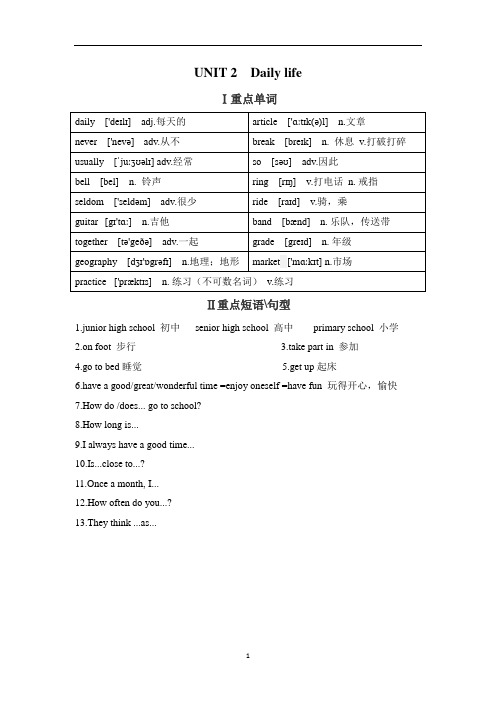
UNIT 2 Daily life1.junior high school 初中senior high school 高中primary school 小学2.on foot 步行3.take part in 参加4.go to bed睡觉5.get up起床6.have a good/great/wonderful time =enjoy oneself =have fun 玩得开心,愉快7.How do /does... go to school?8.How long is...9.I always have a good time...10.Is...close to...?11.Once a month, I...12.How often do you...?13.They think ...as...III详细讲解1. once or twice a week每周一两次注意:在英语中,表示一次用“once”,两次用“twice”,表示三次或者三次以上就用“基数词+times”(time在这里是可数名词,表示次数,需要加“s”)如:once a week,twice a week, three(four/ five…)times a week2. brush one’s teeth刷牙brush ①在这里是动词,表示“刷”②n.可数名词,“刷子”复数形式是“ brushes”。
如:I need some brushes for painting. tooth的复数形式是“ teeth”牙齿(因为每个人刷牙的时候不止刷一颗牙齿,所以要用复数)3.watch television= watch TV 看电视4.ride a bicycle 骑自行车动词短语,交通工具前要加限定词(如a ,the)同义词:by bicycle/bike 介词短语,交通工具前不用加限定词5.be close to 离……近= near =beside= not far away from(上节课学过)6.so在此处用作连词,表示结果“因此;所以”的意思。
Unit 2重点知识点梳理+习题训练(有答案)牛津译林版七年级上册英语
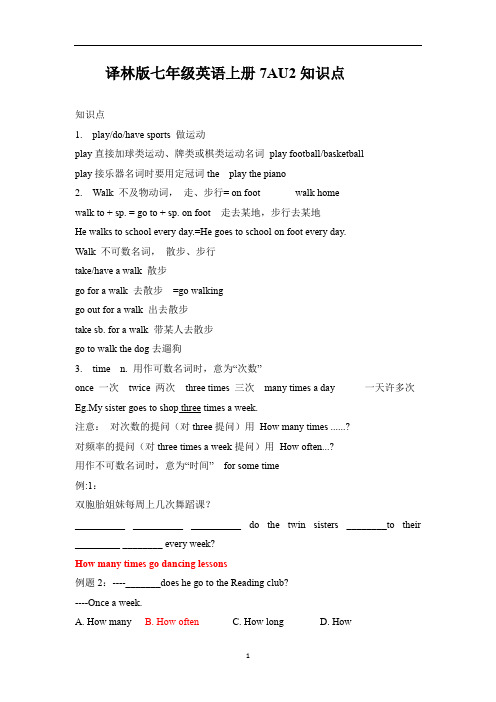
译林版七年级英语上册7AU2知识点知识点1.play/do/have sports 做运动play直接加球类运动、牌类或棋类运动名词play football/basketballplay接乐器名词时要用定冠词the play the piano2.Walk 不及物动词,走、步行= on foot walk homewalk to + sp. = go to + sp. on foot 走去某地,步行去某地He walks to school every day.=He goes to school on foot every day.Walk 不可数名词,散步、步行take/have a walk 散步go for a walk 去散步=go walkinggo out for a walk 出去散步take sb. for a walk 带某人去散步go to walk the dog去遛狗3.time n. 用作可数名词时,意为“次数”once 一次twice 两次three times 三次many times a day 一天许多次Eg.My sister goes to shop three times a week.注意:对次数的提问(对three提问)用How many times ......?对频率的提问(对three times a week提问)用How often...?用作不可数名词时,意为“时间” for some time例:1:双胞胎姐妹每周上几次舞蹈课?__________ __________ __________ do the twin sisters ________to their _________ ________ every week?How many times go dancing lessons例题2:----_______does he go to the Reading club?----Once a week.A. How manyB. How oftenC. How longD. How4.write about 写关于……5.be good at doing sth. 擅长做某事=do well in doing sth6.enjoy doing sth 喜欢、享受……的乐趣enjoy a cup of tea 品一杯茶enjoy oneself 玩得开心、过得愉快= have fun/have a good time例:1:______ he ______ himself there? No, I don’t think so.A.Do, enjoyB. Is, enjoyC. Is, enjoysD. Does, enjoy例题2:—Do you enjoy ________?—Yes, very much.A.play footballB.to play footballC.playing footballD.playing the football7.Li Hua is 22 years old. = Li Hua is a 22-year-old young man.8.after school 放学以后after class 课后9.tell sb.(not) to do sth. 告诉某人(不)做某事talk about sb./sth. 谈论某人/某事talk to sb. 和某人谈话talk with sb. 和某人交谈例题:Sally often talks________ me _________ her family.A.to;withB.with;toC.to;aboutD.about;about10.Favorite 最喜欢的= like...bestfavourite sports 最喜欢的运动Eg.My favorite sport is swimming.=I like swimming best.11.What about.doing sth..?=How about..doing sth .……怎么样?……好不好?12.go+动词ing形式去做某事go swimming go boating go shoppingdo some shopping do some reading do the cleaning13.Play v. player n.运动员例题:Yi Jianlian is my favourite basketball , he is good at basketball.A. player; playingB. playing; playerC. playing; playingD. player; player14.be a member 是……其中一员= be in/on the team......Eg, She is a member of the swimming team.=She is on/in the swimming team.15.live in 住在.....16.in one’s free time 在某人空闲的时间=in one’s spare time= when sb is free free 空闲的free 免费的Are you free.........?17.look + adj. 看起来…… .look strong/beautiful/prettysound + adj. 听起来…… sound great18.make sb./sth.+形容词使某人/某物…… make sb happy 使某人开心make sb do sth 让某人做某事例:Amy’s mother always makes her ________ English every morning.A. readB. readsC. readingD. to read19.would like to do sth =want to sdo sth 想要做某事20.It’s time for sb. to do sth. 是某人该做什么的时间了It’s time to do sth.=It’s time for sth. 是该做什么的时间了21.hope to do sth. 希望做某事hope sb will /can do sth. 希望某人做某事例题:My best friend hopes____________ a great scientist like Qian Xuesen.A. him to beB. beC. isD. to bee true 实现、成为现实Eg.I hope his dream comes true.I hope her dreams come true.23.watch basketball matches 观看篮球比赛watch指全神贯注、目不转睛地看,如电视、球赛等,含有欣赏的味道;read看有文字内容的东西,如看书、看报、看杂志等。
Unit2知识点 牛津译林版英语七年级上册

7AU2知识点New words and expressions:1.walking/swimming/singing /dancing is my hobby.2.Really? /He’s really a paper tiger.3.a bowl of milk4.three times/once a year/twice a weekHow many time—once/three times.How often do you go home? Once a week.5.play tennis/basketball/volleyball/table tennis6.enjoy the school life/working in Beijing/living in Shanghai/myself(玩的开心)7.go swimming/fishing/shopping/walking/running8.eleven football players9.He’s in the football team=He’s a member of the football team10.in the Computer /Reading Club11.He’s free/He’s very busy12.I hope+ (I hope everyone swims very well)I hope to do sth (I hope to go to Beijing by plane.)13.Your dream comes true.14.He’s good at drawing—He draws well15.at weekends—at the weekend (Saturday and Sunday)16.Can I borrow your books? Of course.Here you are17.else What/whatwhere else can you see..?Is there anything else in today’s newspaper?Other+ other books18.a lot of/lots of =many or muchI have a lot of books to read.There’s lots of milk in the glass.19.have fun(in doing sth)/have a good timeHe has fun (in)playing games.20.talk about /of talk to /with me talk about the filmHe’s talking to us about the story21.a few basketball matches22.The twins are our heroesLanguage points:1.Do you have any books ?I don’t have any books2.I walk to school=I go to school on foot.He takes a bus to work=He goes to work by bus.Kate rides a bike to school=Kate goes to school by bike.3.many times a day/five times a week4.What’s your favourite sport? I like playing volleyball5.He often play basketball after school.6.I’m 12 years old.What about him/her/them?7.every week/day/year/Monday this week/evening8.my favourite football star9.She’s in the football club=She’s a member of the football club.10.He works in Beijing.He studies at No1 Middle School.11.He looks strong/ He feels happy/ Music sounds beautiful.12.in his free time,she studies English.13.He also enjoys listening to music=He enjoys listening to music ,too.14.It makes him strong. Listening to music makes her happy.15.He wants to play tennis with me in the next World Cup16.This is our English teacher. Who is this ?That’s Jim’s book. Whose book is that?He’s a teacher What’s he? What does he do?17.He plays tennis at school.What does he do at school?Where does he play tennis?18.He gets up at six. He doesn’t get up at six.Does he get up at six? What time does he get up?19.They do housework at home.They don’t do housework at home. Do they do housework at home? Where do they do housework?20.likes/plays, study—studies fly-flies watches/washes/dresses/goes/does21. ___Jim__ (get) up early? No,______.22.___the twins___(play) football? Yes,____.23.They___(not,read) English at home.He___(not,watch) TV at school.24.When______Sam______(go) to bed? He___(go) to bed at six.25.some of the students/many of the studentsSome of us, all of us26.He doesn’t like sports very much.27.What do you do after school?28.What else does he do?Who else can you see?29.Sometimes I listen to music.30.It makes me feel great.31.He plays volleyball with us/her/them32.read a lot of interesting books /newspapers33.Reading English is fun/interesting.My brother likes basketball very much/best.35.I often play volleyball with my friends after school.。
牛津上海七年级英语下知识点复习汇总Unit 2 Going to see a film
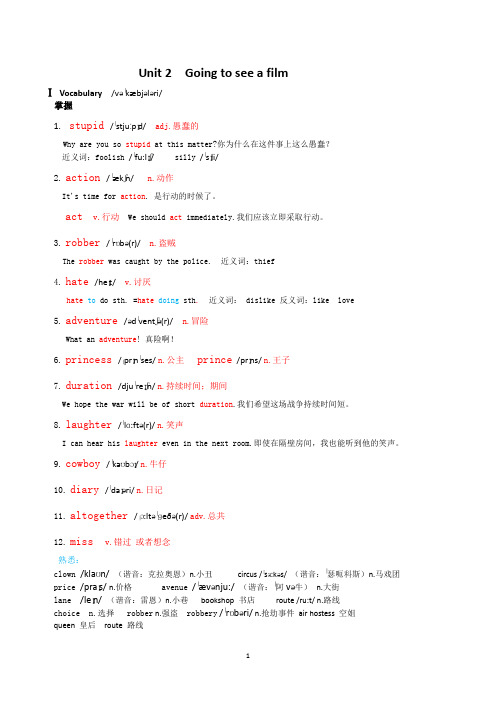
Unit 2 Going to see a filmⅠVocabulary/vəˈkæbjələri/掌握1. stupid /ˈstjuːpɪd/ adj.愚蠢的Why are you so stupid at this matter?你为什么在这件事上这么愚蠢?近义词:foolish /ˈfu:lɪʃ/ silly /ˈsɪli/2.action /ˈækʃn/ n.动作It's time for action. 是行动的时候了。
act v.行动We should act immediately.我们应该立即采取行动。
3.robber /ˈrɒbə(r)/ n.盗贼The robber was caught by the police. 近义词:thief4.hate /heɪt/ v.讨厌hate to do sth. =hate doing sth. 近义词: dislike 反义词:like love5.adventure /ədˈventʃə(r)/ n.冒险What an adventure! 真险啊!6.princess /ˌprɪnˈses/ n.公主prince/prɪns/ n.王子7.duration /djuˈreɪʃn/ n.持续时间;期间We hope the war will be of short duration.我们希望这场战争持续时间短。
ughter /ˈlɑ:ftə(r)/ n.笑声I can hear his laughter even in the next room.即使在隔壁房间,我也能听到他的笑声。
9.cowboy /ˈkaʊbɔɪ/ n.牛仔10.diary /ˈdaɪəri/ n.日记11.altogether /ˌɔ:ltəˈɡeðə(r)/ adv.总共12.miss v.错过或者想念熟悉:clown/klaʊn/ (谐音:克拉奥恩)n.小丑circus /ˈsɜ:kəs/ (谐音:ˈ瑟呃科斯)n.马戏团price /praɪs/ n.价格 avenue /ˈævənju:/ (谐音:ˈ阿və牛)n.大街lane /leɪn/ (谐音:雷恩)n.小巷bookshop 书店route /ru:t/ n.路线choice n.选择 robber n.强盗 robbery/ˈrɒbəri/ n.抢劫事件air hostess 空姐queen 皇后route 路线ⅡPhrase /freɪz/1.take a look=have a look 看一看let's take/have a look around the exhibition./ˌeksɪˈbɪʃn/ n.展览咱们看看展览吧。
译林版牛津英语七年级下册全册Unit2单元知识点及语法归纳
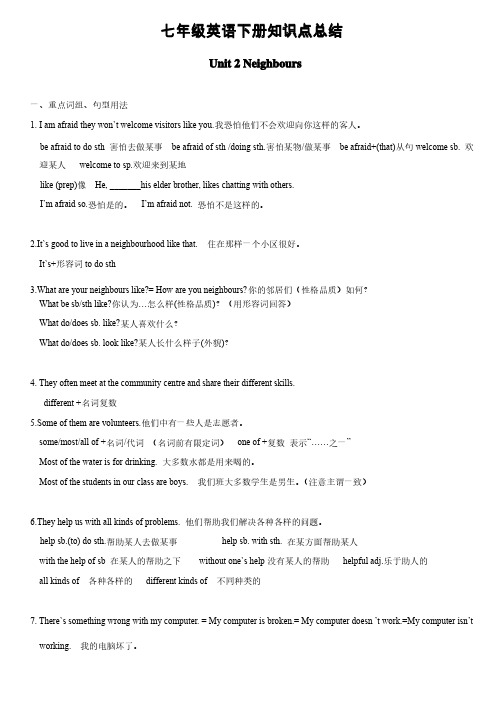
七年级英语下册知识点总结Unit 2 Neighbours一、重点词组、句型用法一、重点词组、句型用法1. I am afraid they won`t welcome visitors like you.我恐怕他们不会欢迎向你这样的客人。
我恐怕他们不会欢迎向你这样的客人。
be afraid to do sth 害怕去做某事害怕去做某事 be afraid of sth /doing sth.害怕某物/做某事做某事be afraid+(that)从句welcome sb. 欢迎某人迎某人 welcome to sp.欢迎来到某地欢迎来到某地like (prep)像He, _______his elder brother, likes chatting with others. I’m afraid so.恐怕是的。
恐怕是的。
I’m afraid not. 恐怕不是这样的。
恐怕不是这样的。
2.It`s good to live in a neighbourhood like that. 住在那样一个小区很好。
住在那样一个小区很好。
It`s+形容词to do sth3.What are your neighbours like?= How are you neighbours?你的邻居们(性格品质)如何?你的邻居们(性格品质)如何?What be sb/sth like?你认为…怎么样(性格品质)?(用形容词回答)?(用形容词回答)What do/does sb. like?某人喜欢什么?某人喜欢什么?What do/does sb. look like?某人长什么样子(外貌)?4. They often meet at the community centre and share their different skills.different +名词复数名词复数5.Some of them are volunteers.他们中有一些人是志愿者。
牛津译林版七年级英语上册Unit2知识点汇总

牛津译林版七年级英语上册Unit2 知识点汇总Unit 2Let ’ s play sports!Words & Phrases:(联合音标志忆)【/??/】walking /'w ??k??, ˋ w?k??/volleyball /'v?lib??l,ˋ vɑ l??b?l/ drawing/'dr??(r)??/course /k??s/ award /?'w??d/ organize/??:g?na?z/ short/???t/ water/'w??t?/chalk /t???k/corner/'k??n?/【/?/】really /'r?:?l?/ member/'memb?/ over /'??v?/ diary /'da??r?/ letter /'let?/seldom /'seld?m/ activity /?k?t?v?ti,?k?t?v?ti,?kˋ t?v?t?/never /'nev?/quarter /'kw??t?/Chrismas /?kr?sm?s/ lantern /'l?nt?n/lion /'la??n/【/??/】bowl /b??l/hope /h??p/hero /'h??r??/ show/???/ only /'??nl?/ borrow/'b?r??/ghost/g??st/ most/m??st/cola/'k??l?/kilo/'ki?l??/whole/h??l/【/?/】club/kl?b/fun/f?n/just/d??st/ other/'?e?/ luck /l?k/once/w?ns/【/i?/】free/fri?/dream/dri?m/ weekend/wi?k??nd/team /ti?m/常有音标:1、Sounds of the letters a、e、i、o、uSentences:1、sb hope that sth does I hope his dream comes true2、划线部分发问:under the tree-Where walking-What does/did sb doSeven o ’ clock-What When does/did he do?Twice a week-How often? does sb do?Two hours-How long? ’ s the time?At 7:00 o’ clock- Because it is useful-Why3、It ’ s time for sth= ItIs it time for sb to do sth?’ s time for sb to do sth4、have fun doing=have a great time doing practise doing sth be busy with sth=be busy doing sth Thanks for / Thank you for doing sthlook forward to doing(would like to do sth---I’ d like to do sth)5、He don ’ t know where to go on Sunday(. ..how to do sth)6、spend (time/money) doing/on sth. Sth costs sb some money to dosth.Sth takes sb some time to do sth.Sb pay some money for sth/sb some money7、show sth to sb=show sb sth8、Do A and B do sth?9、What do you think of sth?= How do you like sth?10、with 就远原则 A with Bs goes to sp.There be就近原则There is a pen and two pencils.不行数目词仍为单数There is lot of good news in today’s newspaper11、one of the members goes12、do after-school activities13、other、the other、the others、another、others14、chat with each other15、your、yours、you16、make sth for sb17、be all nice(adj) to sb18、listen to&hear19、The price is too high(200 yuan)20、have no time to do sth21、each&every + n. does sth22、borrow sth from sb lend sth to sb23、both sides of the road every side of the road24、No news is good news25、Doing exercises helps us get ready26、A member of our school basketball team27、Play with28、do morning exercises29、wake me up30、at seven every morningGrammar: Simple present tense of the verb to do一般此刻时的三种状况:1、things we often do2、things that are always true3、things that are true nowAdd -s to the verb after he、she、it and some exceptions:2、主格与宾格在句子中,主格( the nominativecase)用作主语,宾格( theobjective case)用作宾语。
沪教版牛津英语七BU1-4知识点梳理

3) A: I got up early this morning. B: So did I. (Me too)
4) A: My hair is very long. B: So is mine.
注意:in Moon Bay 在月亮湾
18. get on with … 进展;继续(干某事);和。。。相处(与人相处)
I get on well with my classmates. 我与同学相处得很好。
19. travel guide 导游;旅游指南
How are you getting on with your travel guide ? 你们的旅游指南进展得怎样了?
30. Pudong New District 浦东新区
31. It is convenient to do something. 做某事很方便。
It’s convenient to go shopping in Shanghai. 在上海购物很方便。
32. travel between Pudong and Puxi 在浦东和浦西之间(交通往来)行走
9. Century Park 世纪公园
10. the Oriental Pearl TV Tower 东方明珠电视塔
11. Shanghai Science and Technology Museum上海科技馆
12. Shanghai Zoo 上海动物园
13. Shanghai Wild Animal Park 上海野生动物园
14. Shanghai Museum 上海博物馆
Unit2知识点梳理牛津译林版七年级英语上册

牛津译林版七上Unit 2 知识点梳理1.Eddie, do you like sports? 埃迪,你喜欢运动吗?like:vt.“喜欢”。
反义:dislike。
like sb./sth. “喜欢某人/某物”;like doing sth.“喜欢做某事”(经常性的动作);like to do sth. “喜欢做某事”(偶然性、一次性的活动)。
like还可作prep.“像”。
be like “像……”;look like “看起来像”。
feel like “想要”。
feel like doing sth. “想要做某事”。
sport:n.“体育运动”。
sports 作定语。
sports news “体育新闻”。
2.I like walking. 我喜欢散步。
walking:n.“散步,步行”。
walk:vi.“走,步行”;n.“走,步行”。
take/have a walk “散步”;go for a walk “去散步”;take sb. for a walk “带某人去散步”。
3.Oh, really? 哦,真的吗?really:adv.“实在,真正地,事实上”。
(表示兴趣或惊讶)real:adj.“真的;真实的”。
4.I walk to my bowl many times a day. 我每天往我的饭碗那儿走好多次。
walk to + 地点:“向某地走去,步行去某地”。
(跟地点副词here、there、home时,省略to)time:可数名词,“次,回”;不可数名词,“时间”。
5.The Class 1, Grade 7 students are writing about their favourite sports. 七年级一班的学生正在写关于他们最喜欢的运动。
the Class 1, Grade 7 students:“七年级一班的学生”。
write about:“写关于……”。
6.I’m good at playing tennis. 我擅长打网球。
江苏新版牛津英语7B-Unit-2-知识点

7B Unit 2 知识点Comic strip1.I’m going to visit our new neighbours. 我将要去拜访我的新邻居们。
1) visit v. 参观,拜访visitor n. 访问者,参观者eg: They are visiting Shanghai. 他们正在参观上海。
visit sb. 拜访某人visit sp. 参观某地eg: I’m going to visit my aunt. 我打算去看望我的姑妈。
Many tourists visit China every year. 每年都有许多游客到中国参观。
visit n. 访问,参观eg: They go on a visit to the seaside. 他们去海边游玩。
2) neighbour(s) 邻居n. 美式: neighbor(s)eg: Everyone wants a nice neighbour. 每个人都想要一个好邻居。
2.I’m afraid they won’t welcome visitors like you. 我恐怕他们不会欢迎像你们这样的游客。
1) I’m afraid… 用于礼貌或正式道歉或表示遗憾、对不起、恐怕等,一般用作插入语。
eg: I’m afraid I must leave. 恐怕我得走了。
I’m afraid not 恐怕不行,表示认为对方的意见可能不会发生,是委婉的否定。
eg: ---Would you like to go shopping with me? ---I’m afraid not. I have to do my homework.---和我去购物怎么样?---恐怕不行。
我得做家庭作业。
2) like prep. 像,相似,类似,不能单独使用,要与动词连用be like 像look like 看起来像seem like 仿佛,似乎eg: The Sun is like a great ball of fire. 太阳像个巨大的火球。
Unit2单元测试必备知识点讲义牛津译林版英语七年级上册

常州市2023年牛津译林版7A U2单元测试必备知识点1.冠词Do you know the girl with long hair?你知道那个长头发的女孩吗?the特指的是长头发的女孩the girl with long hairShe plays tennis very well.他打网球非常好.play直接加球类打网球play tennis/打羽毛球play badminton/打乒乓球play pingpongplay the+乐器两者注意区别Play the piano弹钢琴Play the violin拉小提琴Play the guitar拉吉他2.词组和某人谈论某物talk about something with somebodytalk about something to somebodytalk to /with my friends about our dreams和我的朋友谈论我的梦想3.动词的否定句,一般疑问句、特殊疑问句,要用助动词do 、does或者是did Do the children have much time for reading?孩子们有很多时间读书吗?Everyone has a library card.每个人都有一个图书卡.Everyone每个人,做主语,谓语动词是单数4.动词辨析知道know喜欢享受欣赏enjoy思考想认为think制作使让makeDo you enjoy your stay in Changzhou?你待在常州的时候怎么样啊?I had a good time here.在那玩的很开心。
动词用法玩得开心have a good time doing sth4.询问某人的外貌,三个句型都要掌握What is somebody like ?how does somebody look ?what does somebody look like?你的姐姐长什么样子呀?她又瘦又苗条.How does your sister look ?she is tall and slim.5.形容词辨析好的形容词good繁忙的,忙碌的busy免费的,自由的,空闲的free干净的,整齐的cleanExcuse me ,is there a free table ?sorry, it is busy time of day now, all of the tables are full.打扰一下,有空闲的桌子吗?很抱歉,这是一天当中最忙碌的时候,所有的桌子都是满的。
七年英语上册Unit2Let’splaysports重要知识点新版牛津版

Unit2 重要知识点1.do /play sports做运动have a sports meeting 举行运动会sports shoes 运动鞋2.go walking=go for a walkhave/take a walk去散步go out for a walk出去散步take sb for a walk带某人去散步take one’s dog for a walk=walk one’s dog遛狗3.go to spl on foot=walk to spl.步行去某地4.real adj.真实的,真的 ? really adv.的确,确实He ______(real) likes Jim,because Jim is a______(real)friend.形容词:be后名前,修饰名词副词:修饰形容词/动词5.walk to my bowl走向我的碗 ?walk to spl 走向某地6.time 不可数名词:时间some time一段时间 sometime某时可数名词:次数( / 倍)some times 几次 sometimes偶尔,有时many times a/every day一天多次 one time?once two times?twice ≥3数词+times I brush my teeth twice a day.(画线提问)How often do you brush teeth?I brush my teeth two times a day.(画线提问)How many times do you brush teeth a day?7.What/How about (doing) sth? (做)某事怎么样/如何?8.My favourite football player.①like...best like...best②football player足球运动员★swimme r游泳运动员9.a member of.... ...的一员 He is a member of the Football Club.= be in/on.... = He is in the Football Club.= join.... = He joins the Football Club.10.look strong ? 系动词+形容词系动词:be动词,感官动词5个(look,smell,sound,taste,feel),keep11.play football very well.足球踢得非常好。
- 1、下载文档前请自行甄别文档内容的完整性,平台不提供额外的编辑、内容补充、找答案等附加服务。
- 2、"仅部分预览"的文档,不可在线预览部分如存在完整性等问题,可反馈申请退款(可完整预览的文档不适用该条件!)。
- 3、如文档侵犯您的权益,请联系客服反馈,我们会尽快为您处理(人工客服工作时间:9:00-18:30)。
be beneficial to
对-------有利
benefit[英][ˈbenifit]
n.利益,好处;救济金,津贴;义演,义卖;恩惠,恩泽
vt.有益于,有助于;使受益;得益,受益
复数:benefits第三人称单数:benefits过去式:benefitedbenefitted过去分词:benefitedbenefitted现在分词:benefitingbenefitting
使某人吃惊
it astonishes sb. that------
-------让某人惊讶
astonished
adj.感到十分惊讶的
astonishing
adj.令人十分惊讶的
astonishment
n.惊讶
be astonished at -----
对------感到惊讶
be astonished see -----
as far as I’m aware
据我所知
有些系动词与表语有固定搭配须熟记
keep silent
保持安静
stand still
站着不动
go mad
发疯
go hungry
挨饿
fall asleep
入睡
lieawske
睡不着
aallill
生病
come true
变成现实,实现
重点短语
take
采取措施
look out
possession
take possession of
占有;拥有
in possession of
占有
in the possession of sb.
为某人所有
potential
potential[英][pəˈtenʃəl]
adj.潜在的,有可能的;[语法学]可能语气的,表示可能性的;有能力的
n.潜力,潜能;[物]电位,势能;潜能的事物;[语]可能语气
见到------觉得惊讶
to one’s astonishment
令某人吃惊的是
The astonishing news astonishedeverybody.Andthere were astonished looks on their faces.
那个令人惊讶的消息让大家感到惊讶,他们的脸上带着惊讶的表情。
群众
a mass of后既可接可数名词复数也可接不可数名词,作主语时,谓语数通常与名诩保持一致;masses of------作主语时,谓语动词通常用得数。
ifso
Have you e?
ifso如果这样
如果这样,
so用在if之后,代替表示肯定的意义的句子,句中if so的完整形式为“if you have ever seen a doctor.”
benefit from /by
从-------中受益
be of benefit to sb.
对某人有益
for the benefit of
为了-------的利益
possess
possess[英][pəˈzes]
vt.拥有;掌握,懂得;主宰;缠住,迷住
第三人称单数:possesses过去式:possessed过去分词:possessed现在分词:possessing
if not为其否定缩略形式,意为“如果不是这样”,not代替表示否定意义的句子。
ifany
如果有的话
ifever
如果曾经有的话
ifpossible
如果可能的话
ifnecessary
如果有必要的话
wearsb. out
wear[英][wɛə]
易混淆的单词:Wear
[人名] [英格兰人姓氏]韦尔地貌名称,英格兰北部河流名,可能来源于凯尔特语,含义是“水”(water);[人名] [英格兰人姓氏]韦尔地貌名称,坝或堰
留心;寻觅;当心
do eye
做眼保健操
takesth.’s
取代某物
let
放出,发出
swell
肿胀,膨胀
be addicted
对------上瘾
relate------
把------与------相联系
subscribe
同意,赞成
fade
慢慢消失
arrangement
arrangement[英][əˈreindʒmənt]
牛津英语模块七unit2知识点
一、词汇知识
重点短语
focus on
集中于
open up
打开;开拓
in from
以------形式
carry out
执行,实施
try out
测试;参加选拔
in large quantities
大量地
pick out
挑选
by accident
意外地
beneficial
beneficial[英][ˌbeniˈfiʃəl]
复数:potentials
potentialfor (doing)sth.
(做)某事的可能性
realize one’s (full) potential
(充分)发挥某人的潜能
havethe potential to dosth.
有做某事的潜力
astonish
astonish
Vt.使十分惊讶,使吃惊
astonish sb.
vi.(就某事与某人)达成协议,(与某人)商定(某事)(with a person about或for a thing);[音乐](尤指专业)改编乐曲
第三人称单数:arranges过去式:arranged过去分词:arranged现在分词:arranging
arrange that-----
安排------
tryout
try[英][trai]
易混淆的单词:Try
[人名]特里
vt.& vi.试图,努力;实验;审判;考验
n.尝试,实验;[橄]触球,(因触球获得的)向球门踢球的权利
第三人称单数:tries过去式:tried过去分词:tried现在分词:trying
tryout
测试,试验;参加选拔
tryout for ------
参加------选拔
try ------out on------
在------上试验某物
tryforsth.
试图获得;争取
tryon
试穿
mass
mass
adj.大规模的,数量极多的
n.一团;一堆;许多;(物理)质量
a mass of = masses of
许多
the mass of
大多数
the masses
n.安排,料理,筹备,预备;整顿,整理,排列,布置,分类;商定,约定;调解,和解
复数:arrangements
makearrangements forsth.
为某事做好安排
come to/reach an arrangement
达成协议
by arrangement
通过预约
vt.把……(系统地)分类;整理;改编(剧本等);达成……的协议
vt.穿着,戴着;面露;留着(胡须等);磨损
vi.耐用;保持不变;磨损,耗损;逐渐或枯燥地通过
n.穿着;穿戴物,衣物;磨损,穿旧;耐用性
复数:wears第三人称单数:wears过去式:wore过去分词:worn现在分词:wearing
wear sb. out
使筋疲力尽,使厌烦
wear (sth.) out
穿破;用坏
worn out
(指人)疲惫不堪的,(指物)破烂不堪的
be tired of
厌烦;对------厌倦
be tired out
非常疲倦
beaware of
be aware of
知道;意识到
be aware that
明白------;意识到------
make sb. aware of
让某人知道
arrange(for sb.)to dosth.
安排(某人)做某事
arrangesth. for sb.
为某人安排某事
